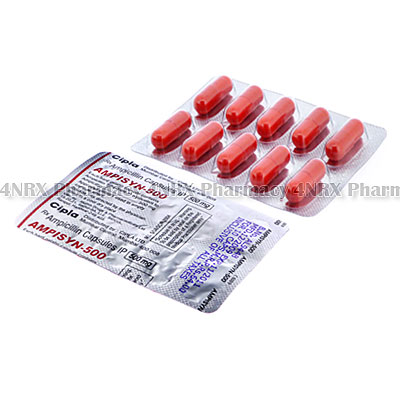 |
Home  Infection Infection  Ampisyn (Ampicillin) Ampisyn (Ampicillin) |
|
|||||||||
|
|
Ampisyn (Ampicillin)
What is Ampisyn (Ampicillin) used for? Ampisyn (Ampicillin) is a penicillin antibiotic prescribed to treat patients suffering from bacterial infections. The medication slows or stops the reproduction of bacteria cells allowing the immune system to destroy or stop the spread of infection. This action makes it useful for treating a wide variety of conditions such as bronchitis, pneumonia, blood infections, urinary tract infections, respiratory tract infections, ear infections, or skin infections. Your physician may also prescribe it to treat other conditions that are not listed here. How should I use Ampisyn (Ampicillin)? Ampisyn (Ampicillin) is typically administered two to four times each day at a dosage of one tablet for a cycle of medication lasting one or two weeks. The best regimen will be determined by your physician based on the condition being treated, the severity of your symptoms, and your current health. Swallow these doses whole with a large glass of water. They may be taken with or without food, but a meal or snack is recommended before administration if you get an upset stomach. Never stop taking the medication before the end of your medication cycle as the infection may not be destroyed and can return stronger and more resistant to treatment. Do not change the form of the medication by splitting or crushing the tablets as this may destroy or alter the effects of their contents. Always ask your physician any questions you have about the medicine to ensure the correct administration. What are the side effects of Ampisyn (Ampicillin)? Side effects that may occur while using Ampisyn (Ampicillin) include:
Serious side effects that may require emergency medical attention are severe diarrhea, faintness, flu symptoms, sensitive skin, easier bruising, unusual thoughts, urinary retention, or seizures. Tell your physician about any unusual symptoms that occur to make sure the correct changes are made to your dosage or application frequency. Please Note Do not begin using Ampisyn (Ampicillin) if you are allergic to penicillin or cephalosporin antibiotics. Also disclose if you have a history of allergies, suspected glandular fever, chronic lymphoid leukemia, or if you have decreased kidney function. These conditions may cause unexpected health problems requiring special alterations to your regimen. Strictly follow all instructions provided to you by your physician or pharmacist while using Ampisyn (Ampicillin). Optimum and safe dosage can differ based on the patient and the condition being treated. As this medication may be unsafe for certain patients, it is essential you always inform your physician if you are pregnant or breastfeeding, as well as if you have any allergies, other illnesses, or ongoing health conditions, and if you are taking any other form of medication, supplements, or herbal products. Immediately seek emergency medical care if you have an allergic or hypersensitive reaction. Common signs of a reaction include hives, swelling, skin rashes, chest pains, as well as trouble breathing or swallowing. 

|
||||||||||||||||||||||